Create Safe Outdoor Spaces With Government Mosquito Control
Reclaiming our yards and community spaces from the relentless buzz and bite of mosquitoes starts with comprehensive solutions that ensure health, safety, and enjoyment for all. With rising temperatures and warmer seasons, these small but formidable foes not only spoil our outdoor experiences but can pose significant health risks, as many mosquitoes can carry diseases like West Nile virus, Eastern equine encephalitis (EEE), and dengue fever.
That’s where government mosquito control programs come in. These programs are not just about pest management; they’re about fostering safer, healthier communities that are protected from the threat of mosquito-borne diseases. VDCI stands at the forefront of this effort, offering Integrated Mosquito Management (IMM) programs to government entities. Integrated Mosquito Management is an environmentally responsible strategy that forms the cornerstone of effective mosquito control, incorporating key components such as monitoring for disease, conducting surveillance, controlling mosquito larvae and adult mosquitoes, and educating the public.

Utilizing an Integrated Mosquito Management Approach for Government Mosquito Control
Integrated Mosquito Management is a comprehensive approach for effectively controlling mosquitoes in our communities. This program consists of four essential pillars: public education, surveillance and disease testing, adult mosquito control and larval mosquito control. With this holistic approach, communities can target mosquitoes at each stage of the life cycle. This strategy helps limit the number of nuisance and potential disease-carrying mosquitoes that become adults, thus reducing potential disease transmission and making outdoor spaces safer and more enjoyable.
Let’s explore the four pillars of an Integrated Mosquito Management program and how they can help protect public health:
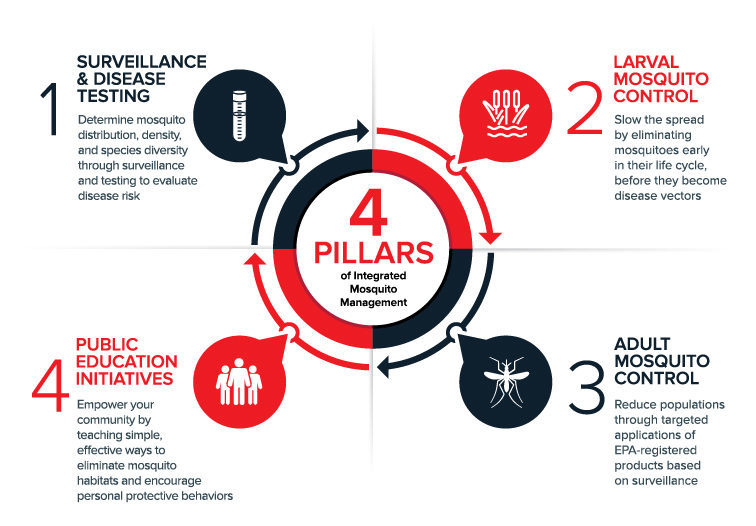
Surveillance & Disease Testing
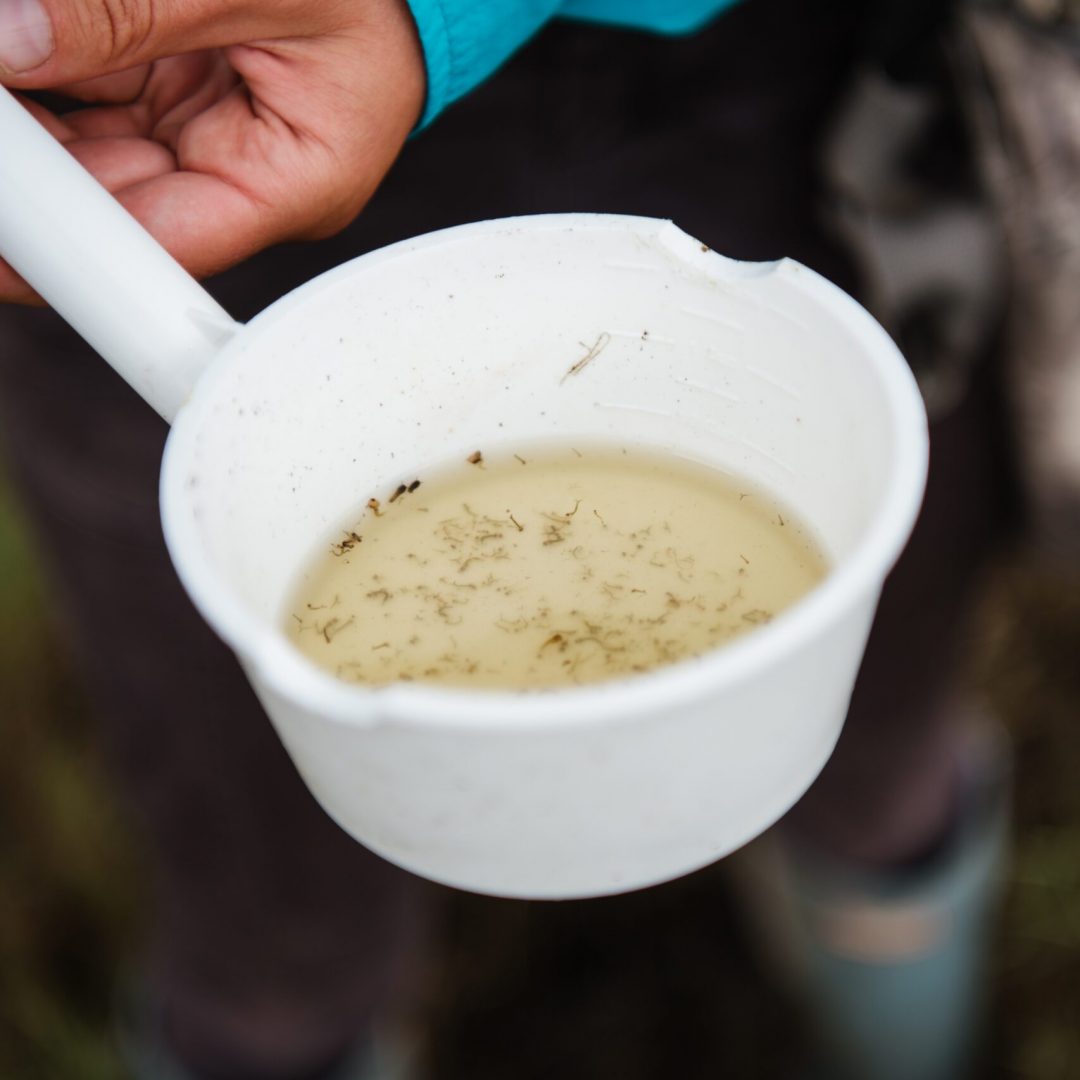
Understanding the unique behaviors of each mosquito species—such as host preferences, feeding times, habitats, and abilities to carry disease plays a pivotal role in government mosquito control. Surveillance efforts are tailored to the mosquito’s life cycle stages, allowing mosquito control experts to accurately gauge factors like species distribution, population density, disease presence, and insecticide resistance within a specific area. Mosquito surveillance occurs at the larval and adult stage. Regularly obtaining data from larval and adult mosquito surveillance allows experts to make informed decisions for timely and strategic interventions. Through comprehensive mosquito surveillance and disease testing, signs of mosquito-borne diseases and community risk levels can be identified early on. Once identified, targeted control efforts can be deployed to reduce mosquito larvae and control adult populations.
Larval Mosquito Control
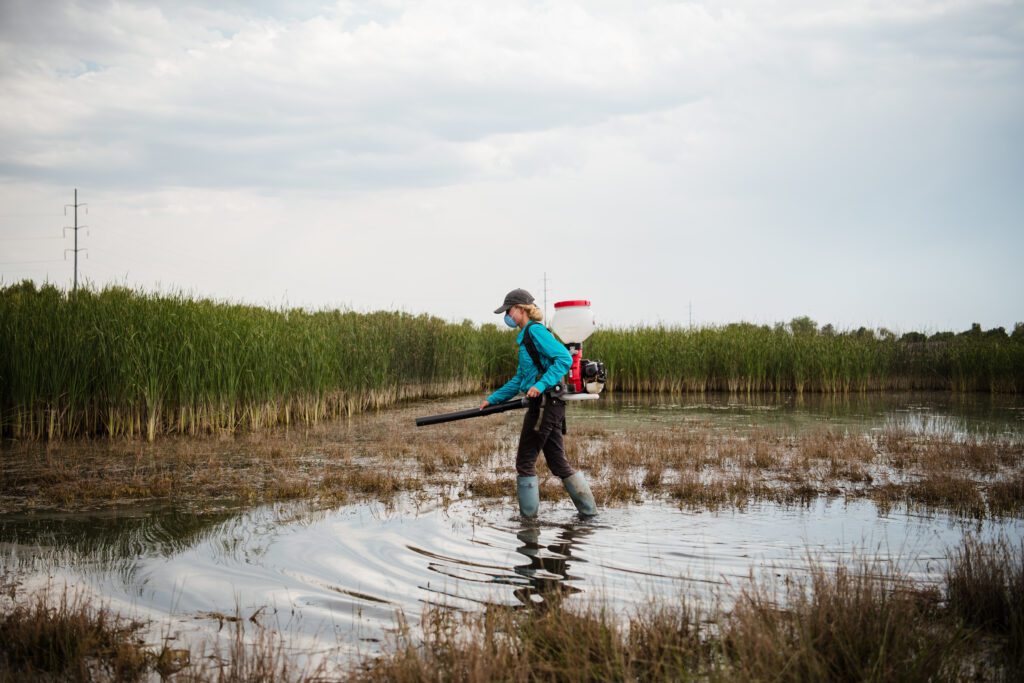
Preventing mosquitoes from maturing into adults is a pivotal aspect of any comprehensive community mosquito control strategy. An Integrated Mosquito Management program takes a proactive approach to mosquito control by eliminating mosquito larvae before they can become adults where they can potentially transmit diseases. By identifying areas where mosquitoes breed, such as ditches, ponds, and outdoor containers like discarded tires or bird baths, we can implement targeted larval mosquito control strategies to reduce adult populations. Sustainable control at the larval stage can be achieved through source reduction, habitat modification, and the use of EPA-registered larvicides.
Adult Mosquito Control
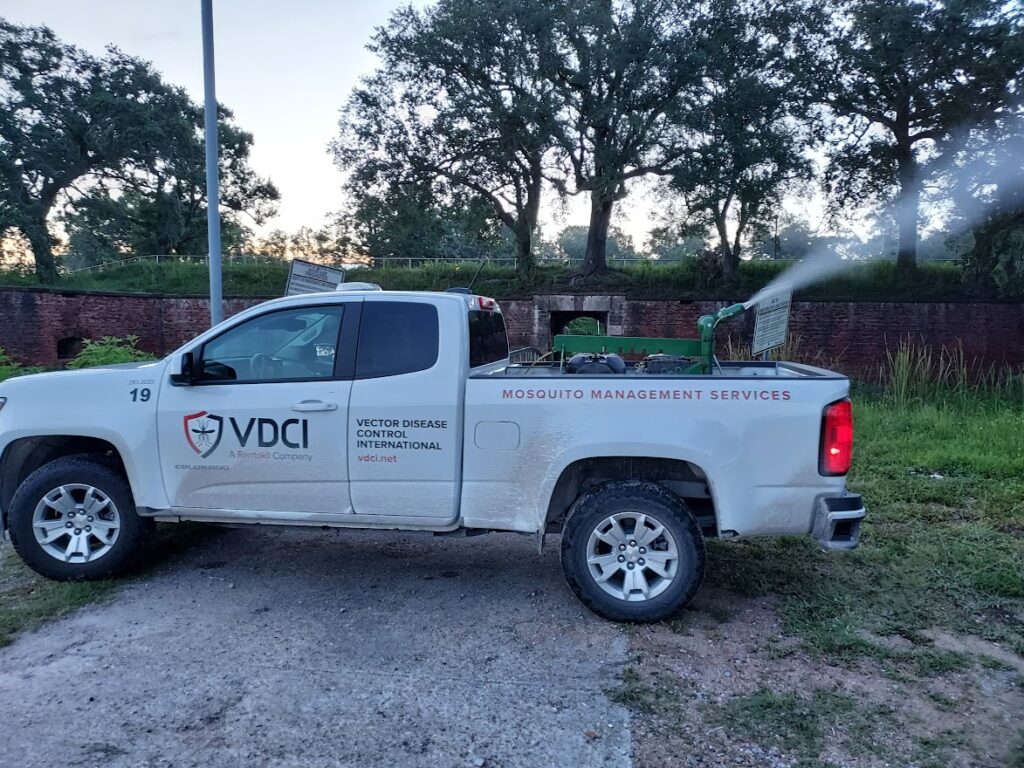
When adult mosquito management becomes necessary, it is carried out with EPA-registered pesticides based on detailed surveillance, targeting areas with high population levels or potential disease-vectoring mosquitoes. By using data to inform management decisions and implementing treatments only when necessary, Integrated Mosquito Management programs can safely and effectively control mosquitoes and limit insecticide resistance. Moreover, at VDCI our scientific team utilizes the latest in technology and scientific-driven data to ensure our treatments target specific mosquitoes, at the right time and place, thus reducing customer costs and limiting unnecessary treatment into the environment.
Public Education
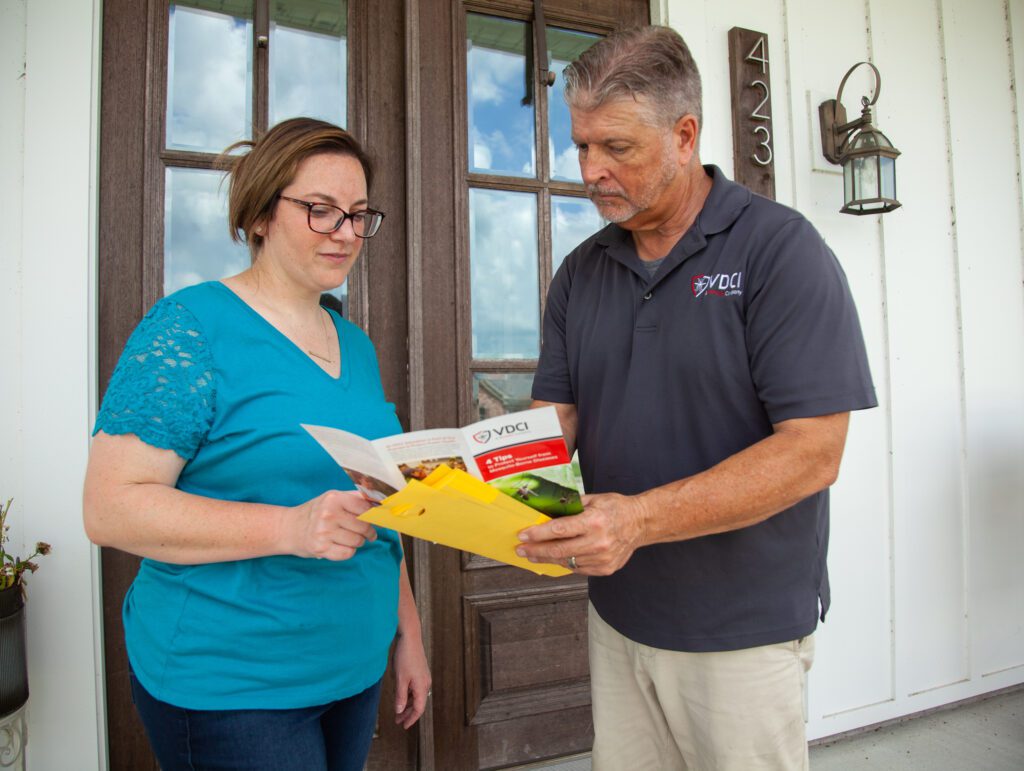
Active participation and collaboration with the public through educational efforts are a crucial part of any community mosquito control program. It’s important for the community to understand the specific objectives of their mosquito control programs, whether focused on reducing the spread of mosquito-borne diseases or managing nuisance mosquitoes. Educating citizens on key aspects of a mosquito management program and guiding them on ways they can protect themselves and their property from mosquitoes can significantly enhance the effectiveness of your Integrated Mosquito Management program.
Community Steps to Help Prevent Mosquito Bites and Breeding

Self-protection goes hand-in-hand with any community mosquito control program and is an important pillar of Integrated Mosquito Management. Community members can help keep themselves safe by practicing the 4Ds: Defend, Dress, Drain, and Dusk & Dawn.
- Defend: Consistently wear and reapply an EPA-approved repellent when outdoors. Repellents should contain 10-30% DEET (N, N Diethyl-meta-toluamide). Keep your pets safe, too, with preventative heartworm medication.
- Dress: Wear closed-toe shoes, light-colored clothing, and long sleeves and pants to keep your skin protected when outdoors. Comfortable, loose-fitting clothes are more effective at preventing mosquito bites.
- Drain: Mosquitoes breed in standing water. Empty standing water from outdoor tools and objects like tires, tarps, buckets, birdbaths, basketball goals, wheelbarrows, and lawn care equipment. Ensure water can drain properly from gutters, flower pots, watering cans, rain barrels, low-lying ditches, and stormwater pipes and structures.
- Dusk & Dawn: Limit spending time outdoors when mosquitoes are most active at dusk and dawn.
Government Mosquito Control with VDCI
At VDCI, our mission is to ensure that everyone can appreciate the beauty of the outdoors with complete peace of mind. We are committed to protecting citizens from the risks of mosquito-borne diseases through Integrated Mosquito Management. Our team of expert entomologists and scientists are dedicated to partnering with government officials to safeguard public health and create safe, more enjoyable outdoor spaces with our environmentally responsible community mosquito control programs. When resources are continuously invested in mosquito control initiatives, community leaders visibly affirm their dedication to ensuring public safety. Contact us to learn how we can help you maintain safe public spaces for your citizens.
Contact Our Experts
Complete the form below or call us at 800-413-4445 to speak to an expert about your mosquito management needs.
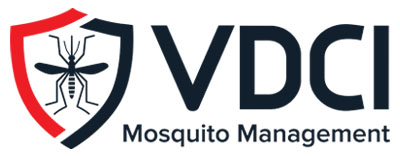 Since 1992, Vector Disease Control International (VDCI) has taken pride in providing municipalities, mosquito abatement districts, industrial sites, planned communities, homeowners associations, and golf courses with the tools they need to run effective mosquito control programs. We are determined to protect the public health of the communities in which we operate. Our mosquito control professionals have over 100 years of combined experience in the field of public health, specifically vector disease control. We strive to provide the most effective and scientifically sound mosquito surveillance and control programs possible based on an Integrated Mosquito Management approach recommended by the American Mosquito Control Association (AMCA) and Centers for Disease Control and Prevention (CDC). VDCI is the only company in the country that can manage all aspects of an integrated mosquito management program, from surveillance to disease testing to aerial application in emergency situations.
Since 1992, Vector Disease Control International (VDCI) has taken pride in providing municipalities, mosquito abatement districts, industrial sites, planned communities, homeowners associations, and golf courses with the tools they need to run effective mosquito control programs. We are determined to protect the public health of the communities in which we operate. Our mosquito control professionals have over 100 years of combined experience in the field of public health, specifically vector disease control. We strive to provide the most effective and scientifically sound mosquito surveillance and control programs possible based on an Integrated Mosquito Management approach recommended by the American Mosquito Control Association (AMCA) and Centers for Disease Control and Prevention (CDC). VDCI is the only company in the country that can manage all aspects of an integrated mosquito management program, from surveillance to disease testing to aerial application in emergency situations.

